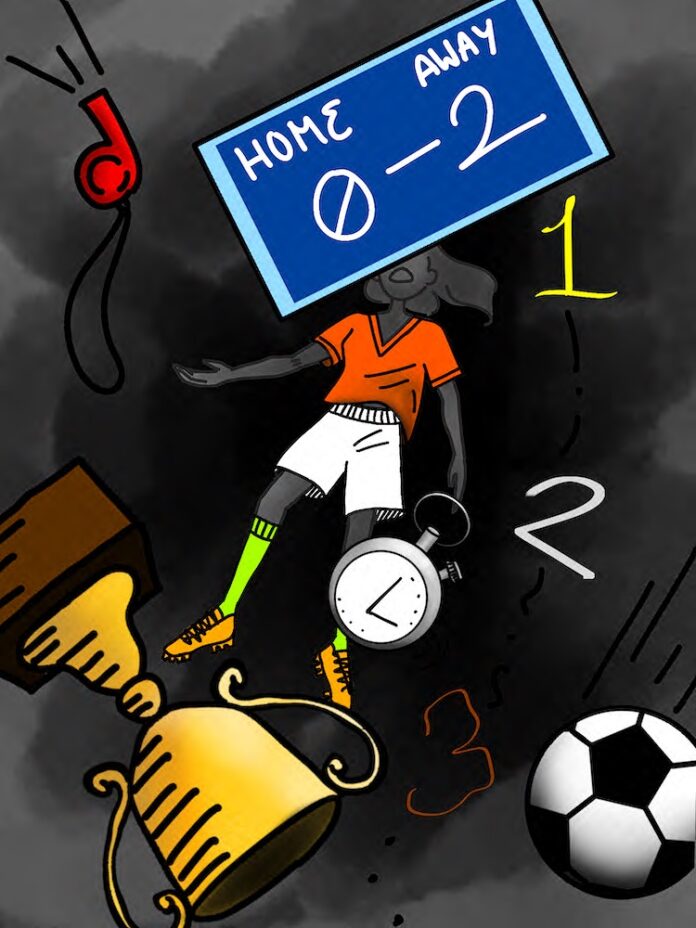It’s impossible to be an athlete and not feel as though your self-worth is dictated by numbers. The number of wins you have, the number of goals you score, the minutes you have on the field — they all pile up and very clearly tell you whether or not you’re doing well.
When I was playing soccer at the club and high school level, the way I was playing and the external validation from teammates and coaches dictated how I felt. I had tied my self-worth to the opinions of others based on my athletic performance, and it began to hurt me. Suddenly, the sport I loved and dedicated my life to wasn’t fun anymore and was crushing me mentally.
Soccer was supposed to stay on the field, but it was seeping into other parts of my life. If I hadn’t played well the day before, then I was likely to be harsher on myself for other, unrelated mistakes, dragging myself through eating, studying and even relaxing.
I ended up completing all four years of high school, but decided not to pursue playing in college. I thought this would be the opportunity I needed to separate myself from the sport and redefine myself away from athletics. But, as soon as I arrived at Oxy, I joined the Ultimate Frisbee club team as a way to stay fit while playing sports recreationally. Very quickly, the same pattern emerged. I was spending more time on the field than I was in the library, and the sport wasn’t even varsity.
Things got to a point my sophomore year when I began overselling an IT band injury just so that I could take time off of my sport, because I thought that that was a more legitimate reason to take time off than saying I needed a break for my mental health. At the same time that I was going to physical therapy for my leg, I also began going to therapy for my mind.
Taking a year and a half off of all sports during college and focusing on myself was one of the best decisions I’ve made — I just wish that I had been able to call it what it was, and wasn’t so ashamed. Time not spent in practice or games, or analyzing my performance in my head for hours, was now spent discovering new interests and finding out who I was outside of a uniform.
During my sabbatical, I saw prominent women athletes Simone Biles, Naomi Osaka and Christen Press announce that they too were stepping back from their respective sports in order to work on improving their mental health. Seeing athletes I deeply respected publicly take a break resonated with me, and I felt validated in my own choices. However, the intense backlash these women received for their personal choices also reminded me why I chose to hide the real reason I was taking time off.
When scrolling on social media, seeing the public statements of each athlete made my heart swell. The explicit words of “taking time away to focus on my mental health” were something that I never thought I would see in sports spaces. Typically, athletes don’t announce time away from their sport unless they suffer a physical injury that would leave them sidelined for several weeks or months. When these types of statements are published, athletes are met with an outpouring of well wishes and support.
As an athlete who has suffered injuries, I am sympathetic toward those who have also been injured. Physical injuries are serious, and can take a person out of a sport forever. Seeing fans offer support during a hard time can lift a person’s spirits as they recover. If mental health was taken as seriously as physical health, these women would have received the same support when they announced they were taking time off.
Seeing the vitriol that rolled in instead of support made me angry. Comments like “you should just retire,” “who cares” and “you’re not a real athlete” flooded beneath their posts. To belittle these women — champions of their own sports and trailblazers for mental health awareness — for putting themselves first was cruel.
If we want to erase the stigma around mental health, then women need to be taken seriously. If I had seen Biles’, Osaka’s or Press’ statements a few years ago, I might have been brave enough to speak up for myself, knowing that these powerful women were doing the same. But seeing the responses they received, I’m not so sure.
On the collegiate level, it is imperative that there are structures of support set up to help athletes and check in with them to make sure that they aren’t overworking themselves. Even though my being a club sport athlete is different than that of a varsity athlete, the presence of trainers and psychologists for all athletes is crucial to ensure their mental wellbeing.
Currently, Occidental offers counseling support through Emmons, but within the long list of mental and physical services provided there are none that specifically work with club athletes to help them balance their athletic and other personal identities, or any other topics they want to work through. While Occidental currently offers athlete-specific counseling called “Between the Lines,” it is only available to varsity athletes. Implementing a sports psychologist that varsity, club and non-team athletes could use would be an immense step in the right direction.
I’d love to see a world where athletes like me don’t have to exaggerate a physical injury before admitting it’s a mental one.
![]()































